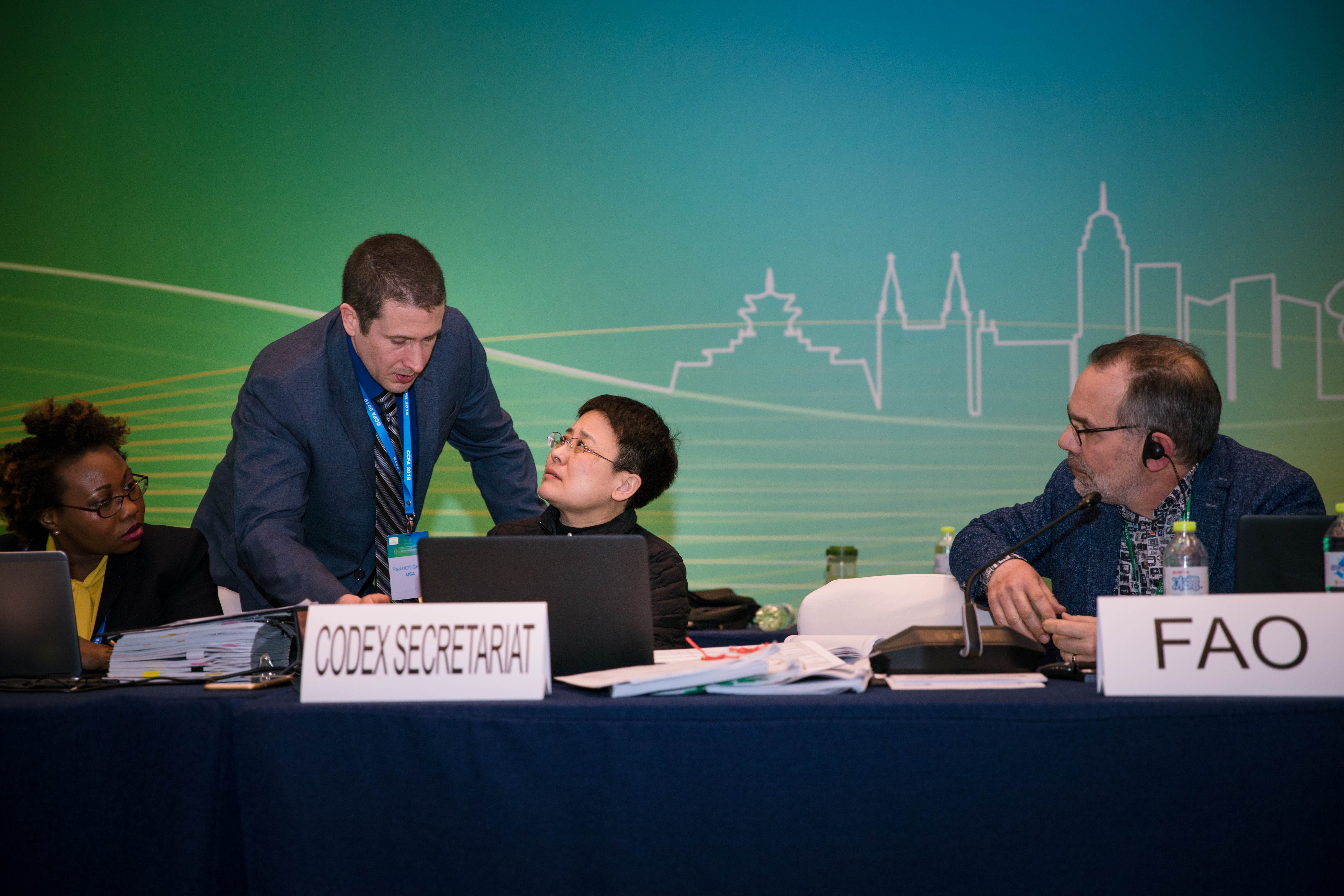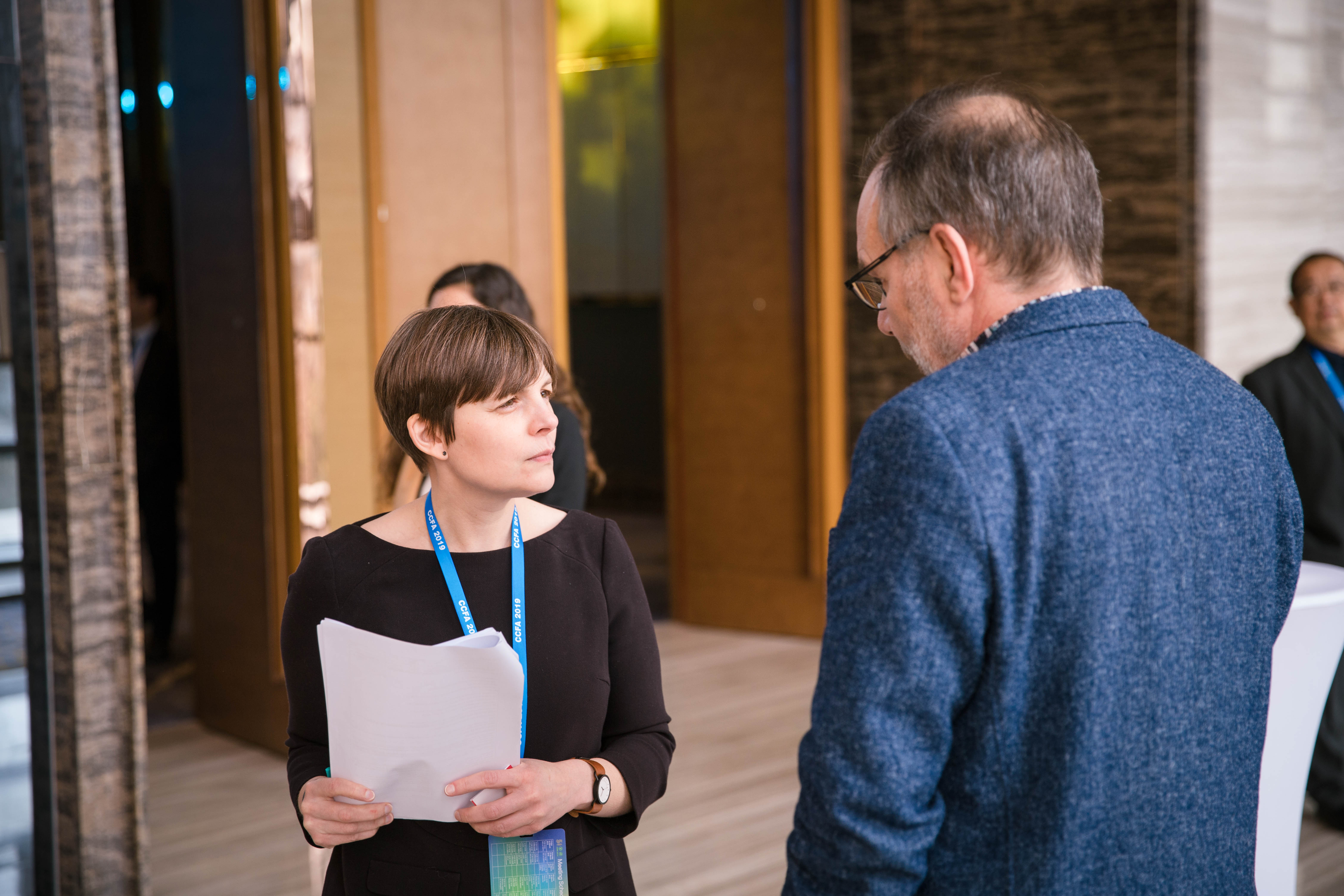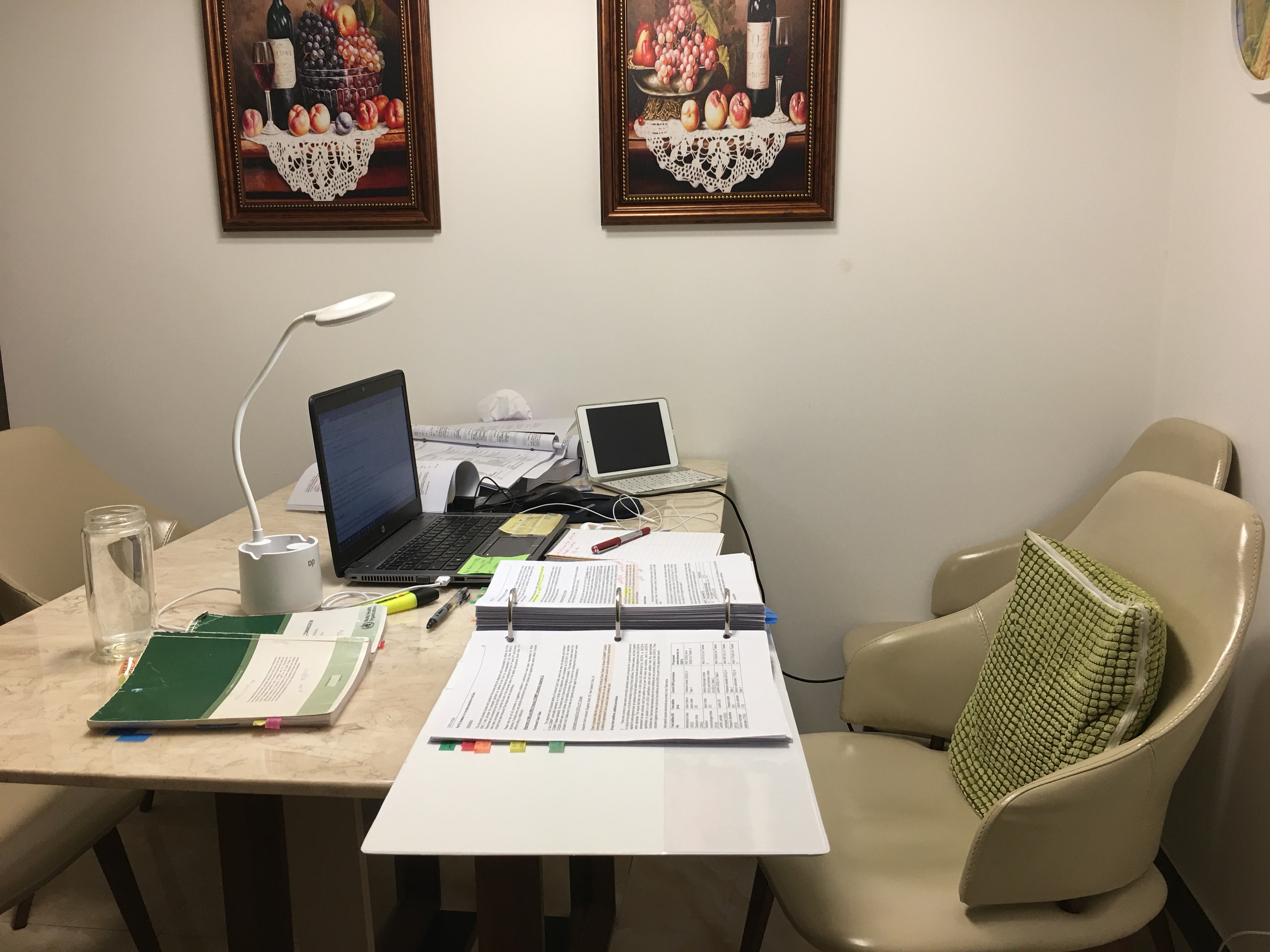Codex food additives working group faces the challenge of virtual meetings
The Codex Committee on Food Additives (CCFA) traditionally holds a week of working groups before its plenary meeting. These technical sessions ensure that one of the core Codex texts, the General Standard for Food Additives (GFSA) is up-to-date in describing the conditions under which food additives may be used in foods and that the additives provisions of the commodity standards align with it, making the GSFA the single reference point for food additives in the Codex Alimentarius.
The group met virtually for the first time from 21 to 25 June 2021 in a series of sessions organized by the Codex Secretariat in collaboration with the hosts of CCFA, China and those chairing the working group.
Lingping Zhang (pictured above in Germany in 2019 with fellow Food Standards Officer Patrick Sekitoleko and Dan Folmer, United States) said: “I feel it is more challenging working virtually. For the physical meetings, it is easy for us to sit together, have the documents in front of us and then discuss face to face. We can do that at any time. Now we have to communicate everything by email, which is not efficient.”
We need to return to physical meetings as soon as we can.
“Codex has done an amazing job in the effort to keep the work moving forward in a virtual environment,” said Folmer. “However, we need to return to physical meetings as soon as we can. Virtual meetings don’t provide the opportunities for interaction necessary to establish consensus on difficult and highly technical issues.”

Paul Honigfort (second left) at CCFA51 held in Jinan, China in March 2019
Virtual meetings and expert working groups have attracted higher than ever attendance during the COVID-19 pandemic presenting both opportunities and challenges for participants and those leading the work. Paul Honigfort, United States, chaired several of the working group sessions.
Preparation is key.
“In this virtual environment I have found that one particular type of preparation is key; that is, to look at a document from the perspective of someone new to the subject. Then ensure as Chair that you present the document in a manner that summarizes not only the topic itself, but also the context surrounding it so that participants understand how we got here and what we are trying to achieve.”

Cynthia Rousselot with Markus Lipp, FAO, at CCFA51 held in Jinan, China in March 2019
Cynthia Rousselot represents the International Alliance of Dietary/Food Supplements Associations (IADSA), a Codex Observer. “The progress made by the working group in a virtual session was impressive. Will I look forward to the informal exchange of views with other delegates that is possible at a physical meeting? For sure!”

Lingping Zhang operates remotely at the CCFA working groups
Virtual meetings require a different approach to planning. “We have to first identify a time relatively suitable for all the relevant people living in different time zones,” said Zhang. With hundreds of pages of working documents and extensive comments from participants there are many issues that need coordinating.
“Working remotely does allow me to turn off my camera for a moment if I need to — or even to grab a bite to eat — but a real challenge is that during the meeting, we are unable to quickly discuss a particular matter with Codex Secretariat colleagues and then provide our suggestions to the Chairperson before they address the meeting,” she said.
Learn more
Follow the work of the next session of CCFA on the Codex website
General Standard for Food Additives (GFSA)
At the heart of the Codex mandate are the core values of collaboration, inclusiveness, consensus building and transparency. Governmental and non-governmental, public and private organizations alike play a vital role in ensuring Codex texts are of the highest quality and based on sound science.
Codex would have little authority in the field of international standard setting if it did not welcome and acknowledge the valuable contributions made by observers. Expert technical bodies, industry and consumer associations
contribute to the standard-setting process in a spirit of openness, collaboration and transparency.
Intergovernmental organizations (IGOs) and international non-governmental organizations (NGOs) can apply for observer status in Codex in order to attend and put forward their views at every stage of the standard-setting process.
 Current Codex Alimentarius Commission
Current Codex Alimentarius Commission
Codex food additives working group faces the challenge of virtual meetings
The Codex Committee on Food Additives (CCFA) traditionally holds a week of working groups before its plenary meeting. These technical sessions ensure that one of the core Codex texts, the General Standard for Food Additives (GFSA) is up-to-date in describing the conditions under which food additives may be used in foods and that the additives provisions of the commodity standards align with it, making the GSFA the single reference point for food additives in the Codex Alimentarius.
The group met virtually for the first time from 21 to 25 June 2021 in a series of sessions organized by the Codex Secretariat in collaboration with the hosts of CCFA, China and those chairing the working group.
Lingping Zhang (pictured above in Germany in 2019 with fellow Food Standards Officer Patrick Sekitoleko and Dan Folmer, United States) said: “I feel it is more challenging working virtually. For the physical meetings, it is easy for us to sit together, have the documents in front of us and then discuss face to face. We can do that at any time. Now we have to communicate everything by email, which is not efficient.”
We need to return to physical meetings as soon as we can.
“Codex has done an amazing job in the effort to keep the work moving forward in a virtual environment,” said Folmer. “However, we need to return to physical meetings as soon as we can. Virtual meetings don’t provide the opportunities for interaction necessary to establish consensus on difficult and highly technical issues.”

Paul Honigfort (second left) at CCFA51 held in Jinan, China in March 2019
Virtual meetings and expert working groups have attracted higher than ever attendance during the COVID-19 pandemic presenting both opportunities and challenges for participants and those leading the work. Paul Honigfort, United States, chaired several of the working group sessions.
Preparation is key.
“In this virtual environment I have found that one particular type of preparation is key; that is, to look at a document from the perspective of someone new to the subject. Then ensure as Chair that you present the document in a manner that summarizes not only the topic itself, but also the context surrounding it so that participants understand how we got here and what we are trying to achieve.”

Cynthia Rousselot with Markus Lipp, FAO, at CCFA51 held in Jinan, China in March 2019
Cynthia Rousselot represents the International Alliance of Dietary/Food Supplements Associations (IADSA), a Codex Observer. “The progress made by the working group in a virtual session was impressive. Will I look forward to the informal exchange of views with other delegates that is possible at a physical meeting? For sure!”

Lingping Zhang operates remotely at the CCFA working groups
Virtual meetings require a different approach to planning. “We have to first identify a time relatively suitable for all the relevant people living in different time zones,” said Zhang. With hundreds of pages of working documents and extensive comments from participants there are many issues that need coordinating.
“Working remotely does allow me to turn off my camera for a moment if I need to — or even to grab a bite to eat — but a real challenge is that during the meeting, we are unable to quickly discuss a particular matter with Codex Secretariat colleagues and then provide our suggestions to the Chairperson before they address the meeting,” she said.
Learn more
Follow the work of the next session of CCFA on the Codex website
General Standard for Food Additives (GFSA)
 Codex and Observer
Codex and Observer
around the world since ancient times.
We might not always know where it comes from,
but we expect it to be available, safe and of good quality.











Leave a comment